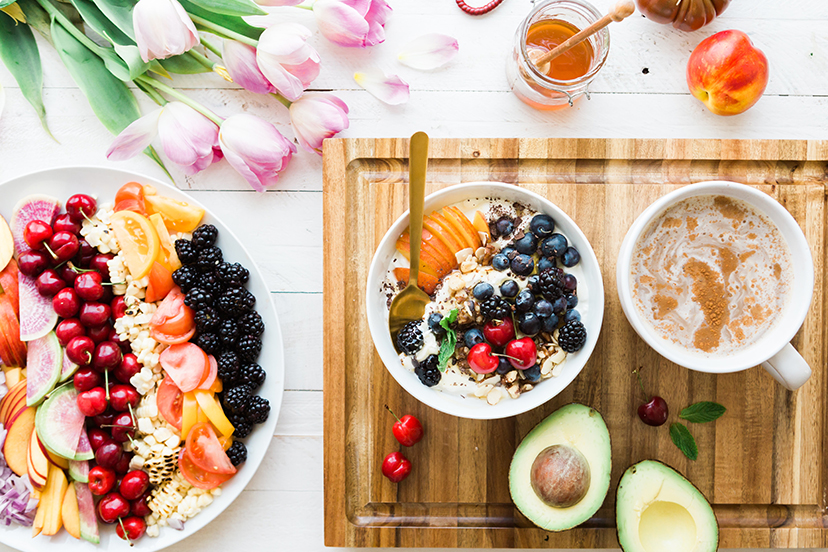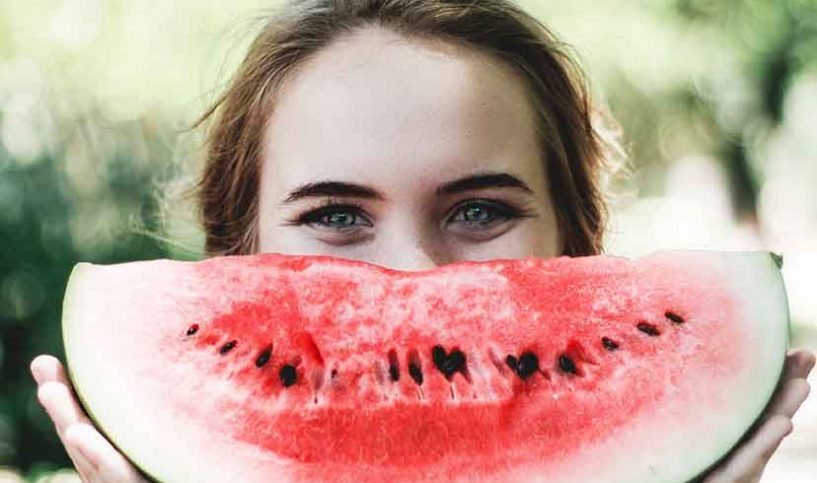There have been many people claiming that they have been able to better their mental state through diet and exercise alone. But, is there really any truth to that? Can good/bad nutrition really affect your mood?
Although a person’s mood can be subject to other factors such as the environment they are in, poor sleep habits, genetics, nutritional deficiencies and of course stress, it is safe to say certain foods have been linked to an overall boost in mood.
Now we’ve all seen the images of people smiling at their salads and wondered why on earth would someone be smiling at a salad (at least I did), but it turns out there’s actually some science behind that. There actually is so much science supporting it, there is a whole disciple dedicated to that called nutritional psychiatry. Certain dietary habits may protect your mental health (1), and in times like these it is vital to keep those in mind!
♦ Fruits and vegetables
Of course, you have heard this many times and I’m sure as a kid you may have even hated hearing this but there really is so much truth behind this! A higher intake of fruits and vegetables has consistently been linked to lower rates of depression partially due to the fact that they are packed with antioxidants .
Berries, high in antioxidants, are a great option for fruit servings. Berries contain mood enhancing, disease-fighting compounds called anthocyanins which have been noted as a possible way to prevent dysphoria and lower chances of depression (2).

♦ Nuts and seeds
Although some people may not be reaching out for nuts and seeds since many consider them on the high calorie spectrum, they are filled with heart healthy fats that are so important to the human body. One thing that nuts and seeds provide is tryptophan, which is an amino acid responsible for producing serotonin in our bodies. Although serotonin has many functions in the human body, it is mostly referred to as the happy chemical as it helps to regulate mood among other things (3).
Some great options for nuts are: cashew, pistachios and almonds!
♦ Fatty fish
Fatty fish such as salmon, albacore tuna, trout and sardines are rich in Omega 3’s which are super important for brain health, as well as development. In some studies, two different types of omega 3’s (docosahexaenoic acid and eicosapentaenoic acid to be exact) were linked to lower levels of depression. So let’s get fishy and happy 😀 (4,5)
♦ Probiotics
Probiotics are widely misconceived as being only found in supplement form. While it is true that they can be found in this form, they are also found in natural states in kimchi, yogurt, kefir, kombucha, and sauerkraut. Probiotics have been known to be promoters of a good microbiome in the gut and some studies even suggest that they help increase serotonin levels (6,7).

Although studies are still being conducted to better understand the relationship between probiotics and mental health, many studies in the past have noted that gut and mental health are in fact directly correlated. A local dietitian, as well as a great advocate on this topic is Dr. Lemia Shaban of Kuwait University. Her highlights on Instagram cover this topic more in depth.
Nutrition is not an overnight thing, and short term changes only yield short term results. In order to truly see a change in your moods, one must approach this from a general well being point of view instead of a restricted one (8). Eating a balanced diet that includes all food groups will help you avoid missing out on any key nutrients that your body needs to function (1).

Finally, and most importantly, although nutrition is a very important component of mental health, it should not stop you from visiting a mental health specialist if you have concerns about your mental well-being.
For more information, visit the American Psychological Association website to stay up to date with related topics. Featured Image courtesy of Unsplash.
References
- Magill, A. (2018, March 13). What is the Relationship Between Food and Mood?
- Godos, J., Castellano, S., Ray, S., Grosso, G., & Galvano, F. (2018, April 24). Dietary Polyphenol Intake and Depression: Results from the Mediterranean Healthy Eating, Lifestyle and Aging (MEAL) Study.
- Fresán, U., Bes-Rastrollo, M., Segovia-Siapco, G., Sanchez-Villegas, A., Lahortiga, F., de la Rosa, P.-A., & Martínez-Gonzalez, M.-A. (2019, April). Does the MIND diet decrease depression risk? A comparison with Mediterranean diet in the SUN cohort.
- Giles, G. E., Mahoney, C. R., & Kanarek, R. B. (2013, November). Omega-3 fatty acids influence mood in healthy and depressed individuals.
- Bozzatello, P., Brignolo, E., De Grandi, E., & Bellino, S. (2016, July 27). Supplementation with Omega-3 Fatty Acids in Psychiatric Disorders: A Review of Literature Data.
- O’Mahony, S. M., Clarke, G., Borre, Y. E., Dinan, T. G., & Cryan, J. F. (2015, January 15). Serotonin, tryptophan metabolism and the brain-gut-microbiome axis.
- Yano, J. M., Yu, K., Donaldson, G. P., Shastri, G. G., Ann, P., Ma, L., … Hsiao, E. Y. (2015, April 9). Indigenous bacteria from the gut microbiota regulate host serotonin biosynthesis.
- Singh, M. (2014, September 1). Mood, food, and obesity.








